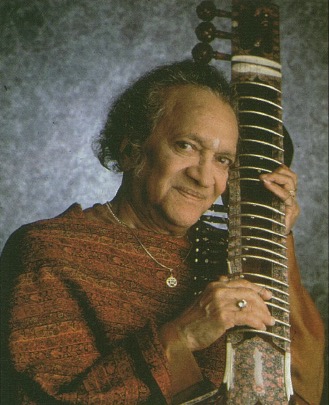Pandit Ravi Shankar’s new CD, “Chants of India,” produced by long-time friend and student, George Harrison, and conducted by Shankar’s daughter and sitar protégée, Anoushka, 16, is a delightful collection of benedictory Sanskrit slokas and mantras. In an exclusive interview, now rare for the 77-year-old musician, Ravi Shankar spoke with Hinduism Today’s correspondent Archana Dongre in Los Angeles, California. Excerpts:
Hinduism Today: Is this CD specifically for Western audiences?
SHANKAR: No. I absolutely deny that. But, I did not do it only for the Indian audiences. This has been one of the most difficult challenges in my life. There are hundreds of CDs floating in the market of various mantras and stotras, which fall into three grades–the traditional shastris’ chantings, mantras in beautiful ragas along with musical instruments, and the commercial film tune version. I did not want to follow any of the above patterns, neither did I want to give it a Western garb, with full orchestration and big chorus. I took a long time to decide my method in order to keep the purity of the sound. I kept the Vedic three-note tune and arranged some ragas in the background, in flute, or violin, or cello, harp or some such instrument, to create celestial sounds. There is lots of religious singing with a very universal appeal. You’ll hear vina, bamboo flute and tambura but no sitar or sarod. From the vast Vedas, after six months of research, I chose a few mantras that denote peace and love. I grew up in a brahmin family listening to many of these slokas and Upanishadic excerpts and became aware of their profound spiritual and calming effect. All this effort is not just for Westerners or for Indians, but for universal appeal.
How has George Harrison contributed?
SHANKAR: His contribution in the vocal or instrumental background is very subtle. He is not a featured artist in it, nor did he compose any music. His role was great as a producer, in balancing, editing and mixing which he did with love and expertise.
Does he respect Sanskrit as you do?
SHANKAR: His love for the Indian culture and Vedic culture is so great that you will not believe it. He has studied it, resulting in knowledge and a deep appreciation. He considers me as a guru, who has initiated him in all this. Thirty-one years ago I gave him a book, Autobiography of a Yogi, and also Raja Yoga by Swami Vivekananda, which changed him so much. Then through the music, he traveled so far, questing after Maharshi Mahesh Yogi and Srila Prabhupada’s movement. We meet quite often.
Some of the pronunciations on the CD are not in accord with Sanskrit grammar.
SHANKAR: The variation in pronunciation is due to regional differences. People from North India, South India, or from eastern or western parts of India tend to pronounce the same word differently. People from almost every state in India have their own peculiarities of pronunciations. It was also difficult to find people with superb voices who also have precise pronunciations. I did consult with scholars during the project.
What are your plans for the Ravi Shankar Foundation in New Delhi and California?
SHANKAR: That foundation will be a nonprofit organization devoted to music, the performing arts and literature. The centers will also house archives of my works and those of other fine musicians. The purpose will be to establish peace and harmony through music. Eventually, I will be spending more of the year in India and less time here in California. The centers will also delve into more creative projects, like my ghanashyam or ballet productions.
When you had come back from India in 1992 to make your home near San Diego you were unhappy with the government.
Shankar: I did have some problems with the Indian bureaucracy at that time, but all that has been solved now. Our government is now doing more than any other government in the world as far as arts and music are concerned.
What is your advice to young musicians of America–either Indians or Americans–wishing to learn Indian music?
SHANKAR: Young people do not like advice. You should give them something, and then find out if they are interested. If they are, by their own choice, that will be a great service to them. My daughter and her friends, George Harrison’s children, and several of my friends’ young children have been favorably impressed with the new CD. Many years ago, when the Gandhi film was released, I found young people were impressed with it. There is something in these that moves them. All my music has spiritual undertones, and the young people are interested in it. Not only in the 1960s, but even today my audience comprises young people.
CD available from: Angel Records, P.O. Box 1592, New York, New York 10028 USA.
